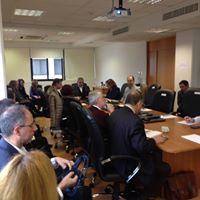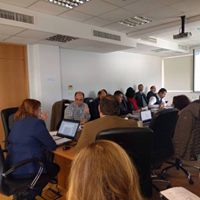CYQAA Privacy Policy
The Agency
Legal Basis of Personal Data Processing
Categories and use of Personal Data
Databases
- Register of Evaluators/Experts The Register of Experts contains a record of current or potential experts for CYQAA’s external evaluations of higher education institutions. It includes the expert’s name, email address, rank, expertise, and a brief history of his/her collaboration with the Agency for the conduct of external evaluations.
- Contacts The database contains a record of CYQAA’s main stakeholders which includes the contact details (name, email address, and position) of relevant personnel. These lists are stored and managed by the CYQAA Secretariat and are used to send information and various correspondence that is targeted to CYQAA stakeholders (ie higher education institutions, government departments and services, professional bodies/associations etc).
- Data for Financial Transactions CYQAA collects and stores information (including the name, address, and banking details) of individuals and organizations with whom it conducts financial transactions. This information is accessible only by staff of the CYQAA and its authorized personnel and the authorized personnel of the Accounts office at the Ministry of Education and Culture.
Any of the above-mentioned data will not be transferred or shared with any unrelated third parties. Only authorized individuals have access to information collected and stored by CYQAA.
Security measures include access to authorized personnel only, high level firewall, encryption, and codes of conduct. Contacts have the right to ask for a copy of the information CYQAA has about them.
CYQAA aims to comply fully with its obligations under the relevant Regulation. For questions or concerns regarding CYQAA’s management of personal data, including the subjects’ access to data about themselves or if they feel that CYQAA holds inaccurate information about themselves the CYQAA’s Data Protection Officer may be contacted at This email address is being protected from spambots. You need JavaScript enabled to view it. or at 22 504345 or to the postal address, Leoforos Lemessou, 2112 Nicosia, Cyprus.
Quality Policy Statement
Further, CYQAA formally commits to implement all necessary measures and mechanisms so that:
- all persons involved in its activities are competent and act professionally and ethically
- they lead to a continuous improvement within the agency
- they enable the agency to guard against intolerance of any kind or discrimination
- they safeguard the appropriate communication with the relevant authorities of the Republic of Cyprus
- they ensure that any activities carried out and material produced by subcontractors are in line with the ESG
- A clear definition of its mission and objectives;
- Compliance with the European Standards and Guidelines (ESG) and the relevant national legislation;
- Quality management of the evaluation process of programs, departments and institutions of higher education;
- Transparency of all its activities;
- Establishment of accountability mechanisms;
- Adoption of a Code of Ethics for every member of the Agency’s personnel;
- Development of a quality culture among its, internal and external, members and collaborators;
- Establishment of monitoring and continuous improvement mechanisms of its activities;
- The periodic external evaluation of the Agency;
- CYQAA’s collaboration with ENQA and EQAR and other European and international organizations relevant to higher education.
-
Scheduling of activities (external evaluations) on a six-month basis, systematic progress monitoring, decision making for internal quality assurance via personnel and council meetings, tasks and objectives achievement appraisal feedback;
-
Formal and informal hearings of higher education institutions and their representative bodies on the development of legislation, criteria, procedures, and instruments related to external evaluation and accreditation processes;
-
Implementation of the Common Assessment Framework (CAF) a total management tool used in the civil service in Cyprus and in Europe.
-
Adoption of the “Code of Conduct and Ethics of Civil Servants” for the staff of the Agency.The document focuses on:
- basic standards and rules governing the behavior of the officers when they come in direct, personal or telephone, contact with the citizens, under the general obligations of decorum, professionalism and honesty.
- ethical standards governing the actions of officials with regards to the handling of citizens' affairs (respect for legality, obligation to impartiality, objective judgment, credibility, accountability and transparency, the duty of equal treatment of citizens and good administration);
-
Monitoring, review and regular updating of the evaluation and accreditation mechanisms and procedures;
-
Meetings of the Agency’s Council on a monthly basis - The Council systematically examines comments, analyses and suggestions and, when appropriate, integrates them in the decision-making process;
-
Collection and analysis of feedback from the Agency’s stakeholders, such as higher education institutions, members of external evaluation committees, student associations, faculty associations, professional associations an
-
ministry of education, regarding the Agency’s organisation, tools, criteria, performance and the evaluation and accreditation procedures.
-
Guidance and training of the members of external evaluation committees and specialised training of the Agency’s staff;
-
Development and regular supplementation of an experts’ registry, with experienced experts in all disciplines from all over Europe;
-
Systematic study of ENQA and other organizations’ publications and reports aiming at the implementation of best practice;
-
Organization of seminars for institutions of higher education aiming at their updating and guidance on the Agency’s policies and its external evaluation procedures;
-
Development and systematic updating of forms, questionnaires, documents etc. targeting transparency and equal treatment of higher education institutions;
-
Monitoring and assessment of the Agency’s procedures and activities by the Council of the Agency and the competent assigned officer;
-
Recording and presentation of the Agency’s activities and distribution of day-to-day tasks to the members of the personnel via bottom-up procedures.
Environmental Policy/Mission Statement
CYQAA is committed to protecting the environment, the health and safety of our employees, and the community in which we conduct our work. It is our policy to seek continual improvement throughout our operations to lessen our impact on the local and global environment by conserving energy, water and other natural resources; reducing waste generation; recycling and; reducing our use of toxic materials. We are committed to environmental excellence and pollution prevention, meeting all environmental regulatory requirements, and to purchasing products which have greater recycled content with lower toxicity and packaging, that reduce the use of natural resources.
Tasks
 |
 |
 |
 |
 |
The Agency has, according to the Law, extended competencies amongst which are the following:
- Institutional, Departmental and Programmatic Evaluation and accreditation of higher education
- Quality Assurance in higher education on the basis of the European Standards
- The Evaluation and Accreditation of cross-border forms of education, offered by local institutions in member states or third countries
- Assessment of the conditions for the provision of cross-border education from foreign institutions in Cyprus
- Assessment of inter-institutional cooperation of higher education institutions
- The provision of information of Quality Assurance in higher education
With the cooperation of Higher Education Institutions, the Agency will contribute towards the effort for the establishment of Cyprus as district center of quality higher education, in accordance to the standards and guidelines provided by the European Network for Quality Assurance (ENQA). The Cyprus Agency of Quality Assurance and Accreditation in Higher Education aspires to join the European Network of Quality Assurance (ENQA) as well as the European Network of Quality Assurance Register (EQAR).

